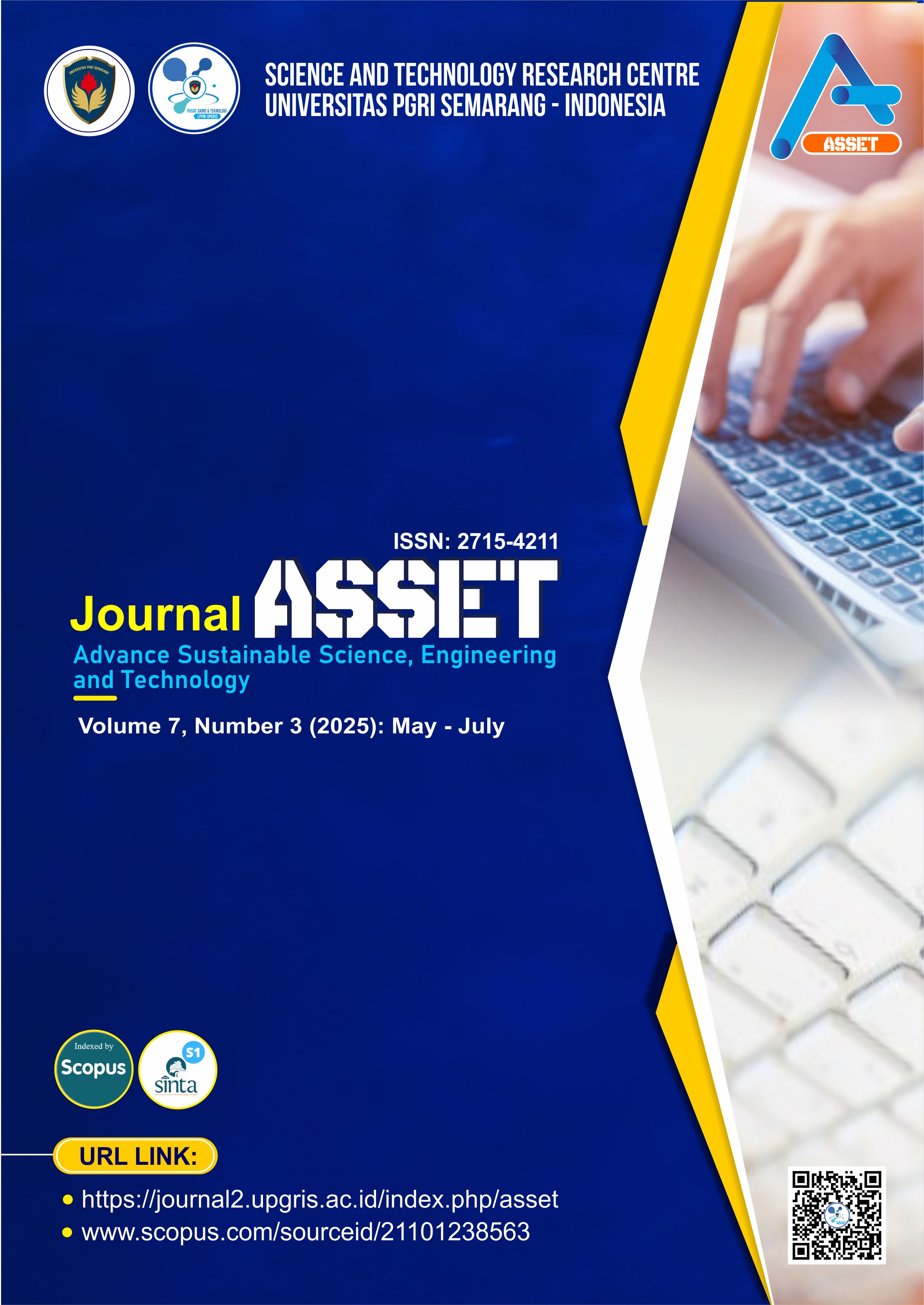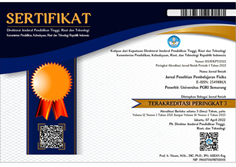Barriers to Lean Manufacturing Implementation in the Bakery Industry: An Empirical Study from Indonesia
DOI:
https://doi.org/10.26877/asset.v7i4.1974Keywords:
Lean Manufacturing, Implementation Barriers, Factor Analysis, DEMATEL, Bakery IndustryAbstract
The implementation of lean manufacturing is essential for companies to minimize waste by reducing non-value-added activities while maintaining product quality and customer satisfaction. Despite its advantages, various barriers hinder its optimal application. This study aims to identify the factors that impede the implementation of lean manufacturing and determine the most dominant factors in bakery factories in Indonesia. The research was conducted across 14 bakery factories on the islands of Sumatra, Java, Kalimantan, and Sulawesi. Data was collected using a survey questionnaire and analyzed using factor analysis and the Decision Making and Evaluation Laboratory (DEMATEL) method. The results reveal seven key factors with significant influence, with technology emerging as the most dominant factor (1.404), followed by organizational culture (0.497). These findings underscore the importance of addressing the technological limitations and organizational culture to enhance lean manufacturing efficiency. The practical implications of this study suggest that bakery companies should focus on improving their technological infrastructure and fostering a culture supportive of lean principles to optimize production efficiency. Theoretical implications include the extension of lean manufacturing frameworks to address sector-specific challenges in the bakery industry, contributing to the broader field of sustainable manufacturing practices
References
[1] Björkdahl J. Strategies for Digitalization in Manufacturing Firms. Calif Manage Rev, 2020;62(4):17-36. https://doi.org/10.1177/0008125620920349.
[2] Rosário A, Raimundo R. Consumer marketing strategy and E-commerce in the last decade: a literature review. J Theor Appl Electron Commer Res, 2021;16(7):3003-24.
[3] Pozzi R, Rossi T, Secchi R. Industry 4.0 technologies: critical success factors for implementation and improvements in manufacturing companies. Prod Plan Control, 2023;34(2):139-58. https://doi.org/10.1080/09537287.2021.1891481.
[4] Qureshi KM, Ali R, Abrar M, et al. Exploring the Lean Implementation Barriers in Small and Medium-Sized Enterprises Using Interpretive Structure Modeling and Interpretive Ranking Process. Appl Syst Innov, 2022;5(4):1-21. https://doi.org/10.3390/asi5040084.
[5] Akmal A, Al-Aomar AM, Asif M, et al. Understanding resistance in lean implementation in healthcare environments: an institutional logics perspective. Prod Plan Control, 2022;33(4):356-70.
[6] de Lima FA, Seuring S, Sauer PC. A systematic literature review exploring uncertainty management and sustainability outcomes in circular supply chains. Int J Prod Res, 2022;60(19):6013-46. https://doi.org/10.1187/cbe.18-04-0064.
[7] Skorupińska E, Hitka M, Sydor M. Surveying quality management methodologies in wooden furniture production. Systems, 2024;12(2):51.
[8] Fernando TD, Ratnayake V. Barriers for lean implementation in apparel industry. MERCon 2021 - 7th Int Multidiscip Moratuwa Eng Res Conf Proc, 2021:620-5. https://doi.org/10.1109/MERCon52712.2021.9525806.
[9] McDermott O, Tichá P, Durnan C, et al. Lean six sigma in healthcare: a systematic literature review on challenges, organisational readiness and critical success factors. Processes, 2022;10(10):1945. https://doi.org/10.1080/09537287.2021.1891481.
[10] Cirillo V, Corsi M, Focacci A, et al. The adoption of digital technologies: Investment, skills, work organisation. Struct Chang Econ Dyn, 2023;66:89-105. https://doi.org/10.3390/asi5040084.
[11] Lutfi A, Rofiq A, Al-Emran M, et al. Evaluating the D&M IS success model in the context of accounting information system and sustainable decision making. Sustainability, 2022;14(13):8120.
[12] Alagaraja M, Herd AM. Understanding multi‐level learning in organizations: a comparison of lean and the learning organization. Perform Improv Q, 2022;34(4):521-46.
[13] Alanazi F. Electric vehicles: Benefits, challenges, and potential solutions for widespread adaptation. Appl Sci, 2023;13(10):6016. https://doi.org/10.1080/09537287.2021.1891481.
[14] Dixit A, Jakhar SK, Kumar P. Does lean and sustainable manufacturing lead to Industry 4.0 adoption: The mediating role of ambidextrous innovation capabilities. Technol Forecast Soc Change, 2022;175:121328. https://doi.org/10.1108/JM2-12-2019-0276.
[15] Ferrazzi M, Ghoniem A, Bravi L, et al. Investigating the influence of lean manufacturing approach on environmental performance: A systematic literature review. Int J Adv Manuf Technol, 2025;136(9):4025-44.
[16] Taherdoost H, Sahibuddin S, Jalaliyoon N. Exploratory Factor Analysis; Concepts and Theory 2 Factor Analysis 3 Types of Factor Analysis 4 Exploratory Factor Analyses. Adv Appl Pure Math, 2022:375-82.
[17] Knekta E, Runyon C, Eddy S. One size doesn’t fit all: Using factor analysis to gather validity evidence when using surveys in your research. CBE Life Sci Educ, 2019;18(1):1-17. https://doi.org/10.1187/cbe.18-04-0064.
[18] Khoa BT, Hung BP, Hejsalem-Brahmi M. Qualitative research in social sciences: data collection, data analysis and report writing. Int J Public Sect Perform Manag, 2023;12(1-2):187-209.
[19] Hessel V, Noel S, De Smet E, et al. Cutting-edge research for a greener sustainable future. Green Chem, 2022;24:399-409. https://doi.org/10.1108/JM2-12-2019-0276.
[20] Mohammadfam I, Soltanzadeh A, Mahdinia M, et al. Analysis of factors affecting human reliability in the mining process design using Fuzzy Delphi and DEMATEL methods. Sustainability, 2022;14(13):8168.
[21] Sharma SS, Pandey P, Sharma BP. Identification and categorization of lean manufacturing barriers in Indian SMEs. AIP Conf Proc, 2020;2273(November). https://doi.org/10.1063/5.0024294.
[22] Singh M, Rathi R. Investigation and modeling of lean six sigma barriers in small and medium-sized industries using hybrid ISM-SEM approach. Int J Lean Six Sigma, 2021;12(6):1115-45. https://doi.org/10.1108/IJLSS-09-2020-0146.
[23] Jaiswal P, Kant R, Agrawal N, et al. Barriers in implementing lean manufacturing in Indian SMEs: a multi-criteria decision-making approach. J Model Manag, 2021;16(1):339-56. https://doi.org/10.1108/JM2-12-2019-0276.
[24] Prasad S, Rao AN, Lanka K. Analysing the Barriers for Implementation of Lean-led Sustainable Manufacturing and Potential of Blockchain Technology to Overcome these Barriers: A Conceptual Framework. Int J Math Eng Manag Sci, 2022;7(6):791-819. https://doi.org/10.33889/IJMEMS.2022.7.6.051.
[25] Abu F, Zulkifli N, Muflih R, et al. The implementation of lean manufacturing in the furniture industry: A review and analysis on the motives, barriers, challenges, and the applications. J Clean Prod, 2019;234:660-80. https://doi.org/10.1016/j.jclepro.2019.06.279.
[26] Alayón CL, Säfsten K, Johansson G. Barriers and Enablers for the Adoption of Sustainable Manufacturing by Manufacturing SMEs. Sustain, 2022;14(4):1-34. https://doi.org/10.3390/su14042364.
[27] Ruben RB, Nagapandi P, Nachiappan S. Modelling and analysis of barriers of lean sustainability in metal manufacturing organizations. Mater Today Proc, 2020;45(xxxx):6807-12. https://doi.org/10.1016/j.matpr.2020.12.980.
[28] Sahoo S. Lean manufacturing practices and performance: the role of social and technical factors. Int J Qual Reliab Manag, 2020;37(5):732-54. https://doi.org/10.1108/IJQRM-03-2019-0099.
[29] Yazdi M, Zarei E, Yazdi M, et al. Improved DEMATEL methodology for effective safety management decision-making. Saf Sci, 2020;127(March):104705. https://doi.org/10.1016/j.ssci.2020.104705.











